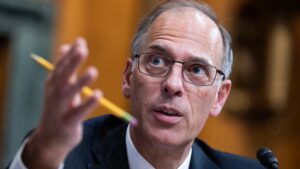Is Your Wallet Ready for Economic Changes? Insights from Extreme Investor Network
As we move through 2023, the conversation around the economy is heating up, especially in light of key figures like Mark Zandi, chief economist at Moody’s Analytics, sharing insights at events like the Consumer Federation of America’s financial services conference. It’s a critical moment to analyze how political shifts—particularly those tied to immigration policy and tariffs—may impact your finances. At Extreme Investor Network, we believe in not just understanding these changes but rather preparing for them. Let’s delve into the implications of Zandi’s forecasts, and what they mean for you and your wallet.
The Current State of Affairs: Optimism and Constraints
According to Zandi, the U.S. economy is exhibiting robust growth, with GDP approximately hitting that enviable 3% mark. Coupled with high productivity and strong business formation rates, you might be feeling optimistic about investments or spending. The stock market has also shown resilience, an encouraging sign for those with a vested interest in equities.
However, Zandi is cautious, suggesting that while we’re currently weathering the economic climate effectively, potential storms loom on the horizon as the political landscape shifts. What are these storms? They’re likely tied to immediate policy changes in immigration and trade that could stir existing economic fundamentals.
Immigration Policy: A Double-Edged Sword
With new administration dynamics underway, Zandi predicts expedited actions on deportation and tight immigration policies. While some may argue whether such measures are beneficial, Zandi points out the economic fabric provided by immigrants, who fill critical roles in labor sectors that have been historically tight, especially as we round out 2022.
According to analysts from Goldman Sachs, recent immigrants have significantly contributed to labor supply where it was most needed. If immigration policies tighten, expect potential labor shortages in essential sectors, further impacting economic growth and stability.
Tariff Talk: The Unseen Price Increase
Tariffs are another point of concern, with Zandi indicating that such measures can create "a whole lot of uncertainty for businesses." If President Trump follows through on his proposed tariffs—potentially ranging from 10% to 20% on imports—it may not just affect manufacturers and retailers but also the end consumer: you.
What does that mean for your spending? Zandi likens tariffs to a tax increase for consumers, predicting notable price hikes across various categories—such as clothing, household goods, and foreign products we often take for granted. The National Retail Federation (NRF) estimates potential double-digit percentage increases across sectors, projecting a 12.5% to 20.6% rise in clothing prices alone. Imagine paying $96 instead of $80 for a pair of jeans—up to $16 might not seem much at first glance, but for budget-conscious consumers, it can be a significant stretch.
Budgeting Strategically in Uncertain Times
At Extreme Investor Network, we understand the potential impact these economic forecasts can have on personal finance. In light of these predictions, here are some proactive strategies to consider:
-
Assess Your Budget: Revisit your monthly spending plan. With prices expected to rise, adjusting where you allocate funds can help cushion the blow.
-
Invest in Essentials: Focus your investments on goods and services that tend to withstand economic turbulence—such as durable goods and essential commodities.
-
Diversify Your Portfolio: If you have investments in sectors that may be negatively affected by rising tariffs, consider reallocating. Explore industries like renewable energy or technology that may prove resilient.
-
Stay Informed: Economic landscapes can change rapidly. Subscribe to trusted financial updates and join discussions to keep your knowledge sharp.
- Prepare for Opportunity: Economic shifts often create unique investment opportunities. Keep an open mind about emerging markets or sectors adjusting to new realities.
Conclusion: Your Finances, Your Future
Change is inevitable in financial markets, particularly with potential federal shifts in immigration and trade policies. By staying informed and adaptable, you can navigate these choppy waters effectively. At Extreme Investor Network, our goal is to equip you with necessary insights and strategies, ensuring that you’re not just reacting to changes, but proactively positioning yourself for a favorable financial future. Whether you’re just starting out or are a seasoned investor, the time to prepare is now. Let’s tackle these economic changes together.
For more tailored insights and personal finance strategies, be sure to explore our additional resources on Extreme Investor Network.

